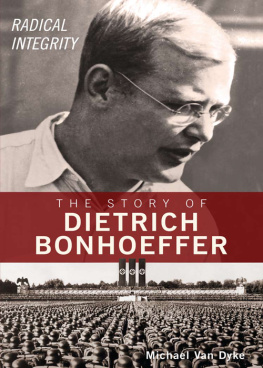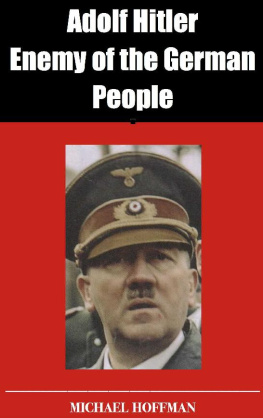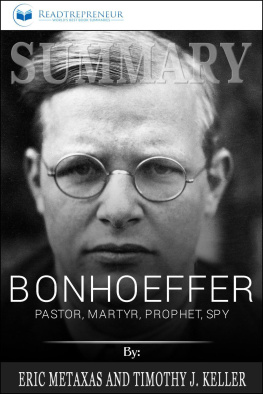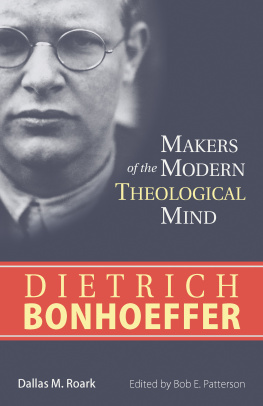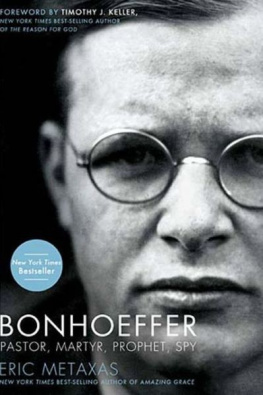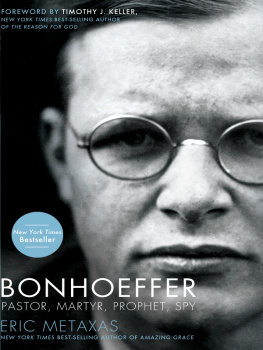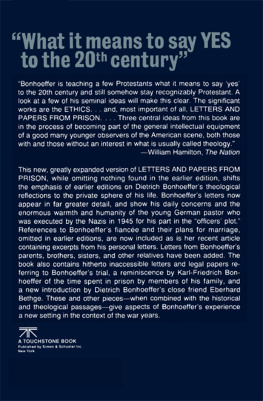Michael Van Dyke - Radical Integrity: The Story of Dietrich Bonhoeffer
Here you can read online Michael Van Dyke - Radical Integrity: The Story of Dietrich Bonhoeffer full text of the book (entire story) in english for free. Download pdf and epub, get meaning, cover and reviews about this ebook. year: 2012, publisher: Barbour Publishing, Inc., genre: Detective and thriller. Description of the work, (preface) as well as reviews are available. Best literature library LitArk.com created for fans of good reading and offers a wide selection of genres:
Romance novel
Science fiction
Adventure
Detective
Science
History
Home and family
Prose
Art
Politics
Computer
Non-fiction
Religion
Business
Children
Humor
Choose a favorite category and find really read worthwhile books. Enjoy immersion in the world of imagination, feel the emotions of the characters or learn something new for yourself, make an fascinating discovery.
- Book:Radical Integrity: The Story of Dietrich Bonhoeffer
- Author:
- Publisher:Barbour Publishing, Inc.
- Genre:
- Year:2012
- Rating:4 / 5
- Favourites:Add to favourites
- Your mark:
- 80
- 1
- 2
- 3
- 4
- 5
Radical Integrity: The Story of Dietrich Bonhoeffer: summary, description and annotation
We offer to read an annotation, description, summary or preface (depends on what the author of the book "Radical Integrity: The Story of Dietrich Bonhoeffer" wrote himself). If you haven't found the necessary information about the book — write in the comments, we will try to find it.
Youll be inspired by this story of a German pastor and theologian who gave his life to oppose Adolf Hitler and his Nazi regime.
Radical Integrity: The Story of Dietrich Bonhoeffer — read online for free the complete book (whole text) full work
Below is the text of the book, divided by pages. System saving the place of the last page read, allows you to conveniently read the book "Radical Integrity: The Story of Dietrich Bonhoeffer" online for free, without having to search again every time where you left off. Put a bookmark, and you can go to the page where you finished reading at any time.
Font size:
Interval:
Bookmark:


2001 by Barbour Publishing, Inc.
Print ISBN 978-1-61626-976-0
eBook Editions:
Adobe Digital Edition (.epub) 978-1-62029-400-0
Kindle and MobiPocket Edition (.prc) 978-1-62029-399-7
All rights reserved. No part of this publication may be reproduced or transmitted for commercial purposes, except for brief quotations in printed reviews, without written permission of the publisher.
Churches and other noncommercial interests may reproduce portions of this book without the express written permission of Barbour Publishing, provided that the text does not exceed 500 words and that the text is not material quoted from another publisher. When reproducing text from this book, include the following credit line: From Radical Integrity, published by Barbour Publishing, Inc. Used by permission.
All scripture quotations are taken from the King James Version of the Bible.
Cover and back photographs: akg-images
Published by Barbour Publishing, Inc., P.O. Box 719, Uhrichsville, Ohio 44683, www.barbourbooks.com
Our mission is to publish and distribute inspirational products offering exceptional value and biblical encouragement to the masses.

Printed in the United States of America.
To Beth.
You show me every day what it means to live for others in a Christlike way.
Thank you for your love.
April 5, 1943Berlin, Germany
H e looked older than his thirty-seven years. Deep lines radiated out from his eyes and across his face. His blond, thinning hair barely covered the top of his head, even if he had combed it carefully. His shoulders slumped as if they were carrying a lead weight. Sweat beaded above his eyebrows.
During the last six months, Dietrich Bonhoeffer had been involved in two attempts to kill the leader of his countrya madman named Adolf Hitler. Both of those attempts had failed. Now, as he sat at a large oak desk in an upstairs bedroom of his parents house, he painstakingly examined every document that was piled on the desk, looking for anything that might reveal his involvement in the plots against the Fhrer.
Thirty minutes earlier, he had phoned his brother-in-law, Hans von Dohnanyi, who was one of his fellow conspirators. When a man with a gruff voice answered the phone, Dietrich knew at that moment that Hans was in the hands of the Gestapo. The secret police force of the Nazi regime would be coming for him next.
As he went through the stack of papers, his mind raced. Should he tell his parents and sister, who were having tea in the kitchen below? Should he try to flee, and if so, where? All he knew for sure was that he needed to destroy anything that would help the Nazis convict him of treason. Thus he carefully examined each piece of paper and placed the ones whose contents looked dangerous in a circular steel wastebasket at his side. Several minutes later, he heard a knock on the front door downstairs and listened as his father shuffled across the floor to answer it.
In the mirror to his left, Dietrich could see himself, but he did not recognize the image. Gone were the robust muscularity of his youth and the smooth, round face that had always given him a boyish look. Now his youth lay on the other side of the time period represented by the papers on his desk.
When Dietrich looked at the last sheet of paper, his father, as if by divine signal, called him from the bottom of the stairs.
Dietrich! Some men down here are asking for you.
Dietrich struck a match on the side of the wastebasket. Im coming, he called back. He dropped the match in among the papers. They slowly crackled into flame, and he watched until the last one had turned as black as tar. Then he calmly walked downstairs and gave each member of his family a brief hug before leaving with the men in dark coats.
He would never again see his parents as a free man.
They rode to Tegel prison in silence. The two men, who had identified themselves as SS agents, had been almost cordial when they led him out to the black Mercedes. They were about the same age as Dietrich and perhaps had some lingering respect for his familys social position.
Dr. Karl Bonhoeffer, Dietrichs father, was one of the most respected psychiatrists in Germany. So esteemed was he that the Third Reich government had even asked him to evaluate certain dangerous prisoners, apparently so that the Nazis could know whether traitors to the regime were insane before they shot them. Dr. Bonhoeffer agreed to do the evaluations out of a sense of professional duty but not out of any sense of loyalty to the Nazis. He hated what the Nazis had done to his beloved Germany and how they had turned a great culture into a barbaric state.
Dietrich could not help thinking about his family as the car made its way toward the outskirts of Berlin. He thought of his older brother Klaus, who was also a part of the conspiracy and whose life would also be in danger. He thought of his brother-in-law Hans. Where could the Nazis have taken him, and what sort of abuse was he suffering? He thought of his sisters: Christine, who was Hanss wife; Sabine, Dietrichs twin and the one he could always confide in; and Susanne, the baby of the family, who was also the most free-spirited of the bunch.
And then he thought of his parents again, both in their seventies now, who had lost a son in the First World War and who were now in danger of losing two more. Though his father was an agnostic, and his mother did not go to church, Dietrich knew that they at least could rely on each other for strength. They were aristocrats from an ancient Prussian family. There was every reason to believe that they would be able to hold up under the strain, at least for a little while. Still, it pained him to be putting them through so much grief.
When they reached the prison, a bleak, concrete structure, Dietrich was led to a chamber where he was commanded to change into prison clothes. He asked if he could make a telephone call, but the officials simply ignored him. All of his personal belongingswatch, cuff links, wallet, and penwere confiscated and placed in a small cloth bag. Then he was led along a corridor where all the doors were solid except for narrow slits where food could be passed through. One of these doors was opened, and Dietrich was pushed into a cell about ten feet long and six feet wide. Even in the dark, he could tell it was filthy.
In one corner of the cell was a small cot, and there was a tiny window above his eye level that let in a bit of late-day sun. Opposite the cot was an old stool. Dietrich placed it beneath the window and stepped up. He looked out and saw all of Berlin spread out before him. Beautiful, doomed Berlin, he thought. Though it was his home, and the place at the center of his dreams, he prayed for its defeat.
But only because that defeat would also mean the destruction of the Nazis.
Dietrich was kept in solitary confinement the first several weeks. His only exercise, which consisted of pacing back and forth in his cell, reassured him that he was alive, and also kept his legs from becoming stiff. The lights were dimmed from 8:00 in the evening until 6:00 in the morning, but Dietrich was never able to get more than six hours of untroubled sleep.
He was disturbed mostly by thoughts of what his imprisonment meant. What effect would it have on his recent engagement and marriage plans? Did it mean that his efforts in the resistance over the last two years were an absolute failure? Or could it possibly mean that this was the end of the world as he knew it? He tried not to let these questions dominate his thoughts.
Font size:
Interval:
Bookmark:
Similar books «Radical Integrity: The Story of Dietrich Bonhoeffer»
Look at similar books to Radical Integrity: The Story of Dietrich Bonhoeffer. We have selected literature similar in name and meaning in the hope of providing readers with more options to find new, interesting, not yet read works.
Discussion, reviews of the book Radical Integrity: The Story of Dietrich Bonhoeffer and just readers' own opinions. Leave your comments, write what you think about the work, its meaning or the main characters. Specify what exactly you liked and what you didn't like, and why you think so.

